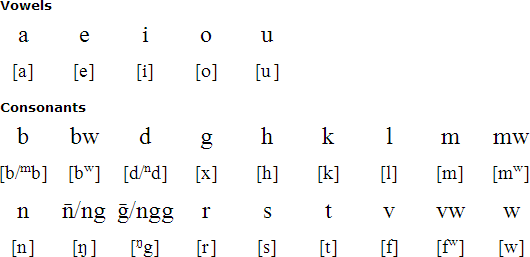Raga is spoken in the north of Pentecost Island in Vanuatu by about 6,500 people. There are also Raga speakers on Maewo island and in Port Vila and Luganville. Raga is a member of the Vanuatu branch of the Southern Oceanic group of Malayo-Polynesian languages, and is also known as Hano, or is sometimes referred to by the names of the villages where it's spoken: Bwatvenua (Qatvenua), Lamalanga, Vunmarama and Loltong.
Raga has borrowed many words from Vanuatu's national language, Bislama, though the Turaga indigenous movement has been trying to find or coin native Raga words to replace those borrowed from Bislama.
In the late 19th century a number of missionaries, such as John Coleridge Patteson, Thomas Ulgau and Terry Crowley compiled grammatical descriptions and vocabulary lists of Raga, and also translated a few religious texts into the language. More recently a number of linguists have written papers on Raga, though there is no complete description of the language.

Download an alphabet chart for Raga (Excel)
Members of the Turaga indigenous movement use a script known as Avoiuli, from the Raga words avoi (talk about) and uli (draw/paint), which was devised by Chief Viraleo Boborenvanua and based on traditional sand drawings. It is used as an alternative to the Latin alphabet for writing Raga, and can also be used for writing other Vanuatu languages, such as Apma and Bislama, and for English.
Information about Raga
http://www.pentecostisland.net/languages/raga/
http://en.wikipedia.org/wiki/Raga_language
https://talkingdictionary.swarthmore.edu/raga/
Holy Communion in Raga
http://justus.anglican.org/resources/bcp/Melanesia/raga_hc.htm
Adzera, Ahamb, Äiwoo, Aneityum, Apma, Araki, Are, ʼAuhelawa, Avava, Babatana, Bariai, Bola, Big Numbas, Buhutu, Bwaidoka, Caac, Cheke Holo, Dorig, Hiri Motu, Hiw, Hoava, Kakabai, Kaninuwa, Kokota, Kove, Kurti, Lakon, Lehali, Lenakel, Lewo, Lote, Lo-Toga, Löyöp, Manam, Marovo, Maskelynes, Mato, Mavea, Mono-Alu, Motu, Mussau-Emira, Mwotlap, Nafsan, Nahavaq, Namakura, Nanggu, Nduke, Neve‘ei, Neverver, Ninde, North Efate, Nume, Paamese, Papapana, Raga, Rotuman, Roviana, Sa, Sakao, Saliba, Siar, Sio, Ske, Sobei, Sursurunga, Tamambo, Tami, Teanu, Tigak, Tirax, Tolai, Touo, Ubir, Ughele, Uneapa, Vatlongos, Vitu, Vurës, Western Fijian, Yabem, Yapese
Languages written with the Latin alphabet
Page last modified: 06.03.23
[top]
You can support this site by Buying Me A Coffee, and if you like what you see on this page, you can use the buttons below to share it with people you know.

If you like this site and find it useful, you can support it by making a donation via PayPal or Patreon, or by contributing in other ways. Omniglot is how I make my living.
Note: all links on this site to Amazon.com, Amazon.co.uk
and Amazon.fr
are affiliate links. This means I earn a commission if you click on any of them and buy something. So by clicking on these links you can help to support this site.
[top]